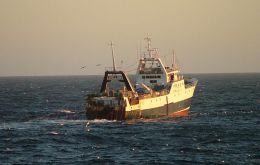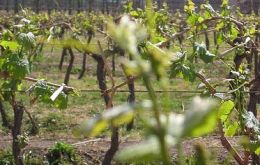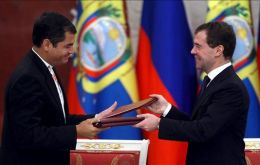MercoPress. South Atlantic News Agency
Stories for October 2009
-
Saturday, October 31st 2009 - 01:20 UTC
Gibraltar promotes tourism in Madrid with Spanish airline support

The Gibraltar Tourist Board held a tourism workshop in Madrid, Spain this week, in conjunction with Ándalus Líneas Aéreas, as part of the Rock’s government’s commitment to an ongoing joint marketing drive with the airline in Spain.
-
Saturday, October 31st 2009 - 01:16 UTC
Zelaya and Micheletti agree to deal to end the institutional crisis

The de facto Honduran government has agreed to an eight point deal that may allow ousted President Manuel Zelaya to return to power ahead of elections next month. Unite States diplomats have been in the country to mediate an end to the four-month-old crisis.
-
Saturday, October 31st 2009 - 00:12 UTC
Falklands Fisheries research vessel surveys hake, hoki and grenadier

Falkland Islands Fisheries Research vessel Castelo returns to FIPASS on Monday after two weeks at sea carrying out surveys in the southwest of the Falkland Islands Interim Conservation Zone (FICZ).
-
Friday, October 30th 2009 - 22:13 UTC
State of the art HMS Scott takes over Ice Patrol HMS Endurance Antarctica duties

The Royal Navy's advanced deep water survey ship HMS Scott was deployed this week to the Antarctic for the first time. She will take over patrolling and surveying duties in Antarctica and the South Atlantic from Ice Patrol HMS Endurance.
-
Friday, October 30th 2009 - 21:59 UTC
Argentina buys wine from Chile to face shortfall in production

Still hurting from a yearlong drought, Argentina is turning to Chile for wine imports in order to keep up with popular demand for wine.
-
Friday, October 30th 2009 - 21:56 UTC
Ecuador signs arms and energy deals with Russia: “just the beginning”

President Dmitry Medvedev called new arms and energy deals between Russia and Ecuador just a beginning as Moscow strives to deepen ties in Latin America. Medvedev and Ecuadorean President Rafael Correa announced a 22 million US dollars deal for Russia to provide Ecuador with two Mi-17 transport helicopters.
-
Friday, October 30th 2009 - 21:51 UTC
Ecuador to pay royalties on pharmaceutical patents

Ecuador is to pay royalties to the holders of international pharmaceutical patents, basing the payments on the sale price of locally produced medicines, the Ecuadorian Institute of Intellectual Property, or IEPI, said this week.
-
Friday, October 30th 2009 - 11:10 UTC
Argentina Chile plan to bore two integration tunnels under the Andes

Relations between Argentina and Chile are going through an optimum moment and once we drill through the Andes, “ghosts of the past will definitively have gone”, said Argentine president Cristina Fernandez de Kirchner during the first of her two day visit to Chile.
-
Friday, October 30th 2009 - 11:07 UTC
Buenos Aires city and province issue IOUs to pay suppliers

Faced with extremely tight finances, both the city and province of Buenos Aires have decided to pay suppliers with bonds to bridge the widening spending gap, the Argentine State Supplier Union, or UAPE, said in a press release Thursday.
-
Friday, October 30th 2009 - 07:35 UTC
Cuba’s Sugarcane Ethanol Potential: the Return of King Sugar

“Central America and the Caribbean, historical sugar-producing economies where the sugar-ethanol infrastructure already has a foundation, labor costs are low, and the political conditions are more or less stable– offers the best near-term potential for large-scale sugarcane ethanol production. This is a market opportunity which Cuba, with the longest experience of sugar–ethanol and sugarcane derivates production in the region, is positioned to take advantage of”.
